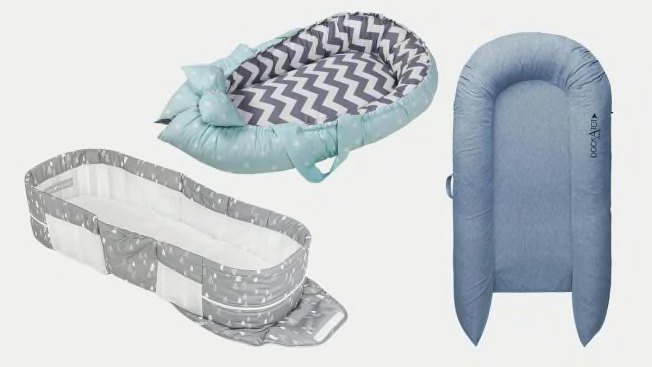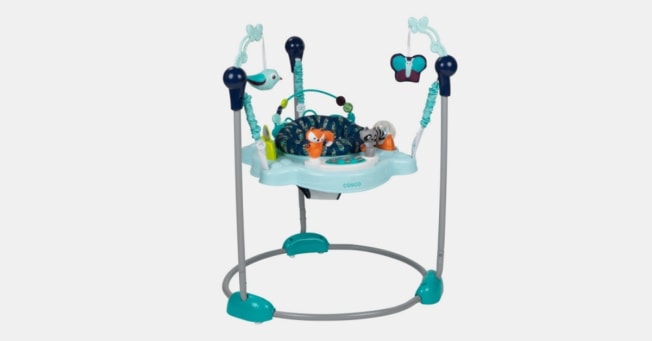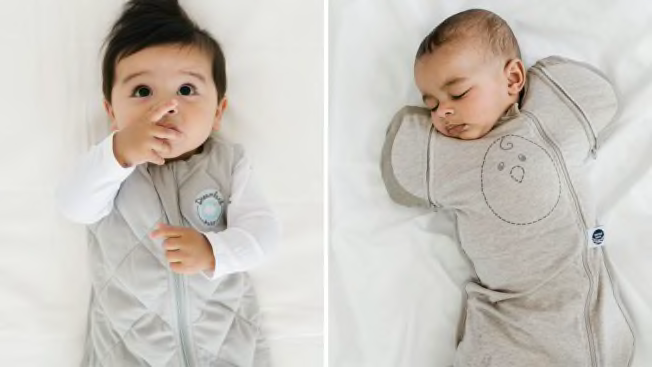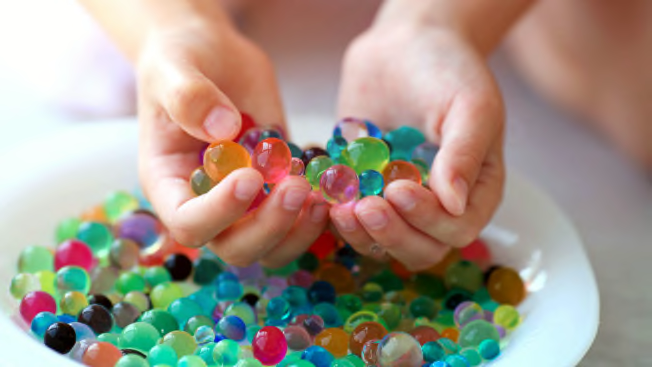CR safety experts analyzed dozens of incident reports and parent reviews
From left to right: An Oterroo baby “neck float,” a Cosco Jump, Spin & Play activity center and a Nested Bean weighted blanket are among the baby products CR warns about.
By Lauren Kirchner
Most people assume that if something is for sale in the US, it must be safe to use. Especially in baby gear, when the stakes are so high, right?
The reality is that while many types of baby products must undergo safety testing before they hit the market, some may still go unnoticed. For example, new products may not yet meet required safety standards and therefore arrive in stores before independent testing has been carried out. Or sometimes, even when regulators and security guarantors think that a product on the market poses a risk, the manufacturer does not agree to withdraw it.
Therefore, it is often up to consumers to research the safety of items themselves, by reading reviews or searching the public database of incidents reported to the Consumer Product Safety Commission (CPSC). the federal agency that oversees thousands of household products. Consumer Reports is also here to help you in any way we can. Here are five products CR safety experts say parents and caregivers should skip when preparing for a new baby.
baby loungers
When you’re caring for a baby 24/7, you’ll need some safe and comfortable places to lay your baby down once in a while and give your arms a rest. But when it’s time for baby to nap or sleep through the night, the American Academy of Pediatrics says she should always be on a firm, flat surface, with nothing soft around her. This is why baby loungers are dangerous. Many of them have padded sides that look like good protection, but can actually be a choking hazard.
The Cutelions Baby Lounger and Baby Nest Sharing Co Baby Bassinet, DockATot Grand Dock and Baby Delight Snuggle Nest Portable Baby Lounger.
Source: Cutelions, DockATot, Amazon
In 2021, the CPSC passed a new rule banning several types of unsafe sleep products for babies, including inclined sleepers (like Fisher Price Rock ‘n Play) and bed sleepers (like Dock a Tot and the Baby Delight Snuggle Nest). But some of these companies still sell their products, choosing instead to market them as “loungers.” And while they’re not supposed to use sleep-promoting language, parents understandably believe, based on their appearance, that it’s okay for their kids to nap.
When asked, Dock a Tot said that while the company disagrees with the CPSC’s approach to lounger-like products like the Deluxe+, in good faith, it stopped selling any Deluxe+ loungers made after the sleep rule passed. CPSC Children’s Regulations take effect in June 2022.
Jason Macari, CEO of Baby Delight, also told CR that the company has stopped manufacturing the Snuggle Nest lounger, though it still maintains its safety, and remains on sale until stock lasts.
The CPSC has flagged safety problems with other loungers before: In 2021, the agency announced a recall of the Boppy infant lounger after it was linked to eight deaths; and in 2023, it urged consumers to stop buying used versions of the product. And earlier this month, the CPSC issued a public statement asking consumers to immediately stop using La-La-Me infant loungers, explaining that they violated the agency’s infant sleep rule and posed risks to infants both from suffocation and from falls. The manufacturer did not agree to recall it, the agency said in the statement, but any owner of one of these loungers should destroy and dispose of it. La-La-Me could not be reached for comment. And Boppy also didn’t respond to our request for comment.
CR safety experts recommend that parents and caregivers put their babies to play in products that meet mandatory safety rules, such as bouncers, and ensure that they sleep only in approved sleep products, such as a play yard, a crib or bassinet.
Cosco Jump, Spin & Play Activity Centers
Safety advocates at Consumer Reports called for the recall of this Walmart-sold play center, made by Cosco, after seeing numerous reviews online and several incident reports to the CPSC of parents saying their babies had fallen from them. Many people have described their babies suddenly falling to the floor when the support straps holding the seat in place broke or came loose without warning. Parents recounted that their children ended up hanging sideways from their seats or, in some cases, hitting the ground. Fortunately, none of the injuries appeared to be life-threatening.
Consumer Reports urged parents to immediately stop using the Cosco Jump, Spin & Play activity center after the company recalled the product, after multiple complaints from parents.
Source: Cosco Kids
“I wish I had seen the reviews before I bought this,” Madi of Beaumont, Texas, wrote in a review of the product on the Cosco Kids website. “We didn’t even get to use the product for an hour before the reviews came true. My son was jumping in the hammock and suddenly the leash came loose and he fell to the ground.”
Rick Leckner, a media representative for Dorel Juvenile, the manufacturer’s parent company, told CR that the company has been in contact with the CPSC about the product and that it “takes all safety issues very seriously.”
Otteroo “Neck Floats”
Otteroo’s baby “neck floats” are inflatable rings that fit around a baby’s neck to keep them afloat in the bathtub or pool, and are marketed by the company for use from babies as young as two weeks of age to forward. The CPSC pointed to dozens of incidents the agency had received of infants having to be rescued by their caregivers after their heads suddenly slipped through the floats and they plunged into the water. Several babies were sent to the hospital and one suffocated and died, according to incident reports in the CPSC’s public database.
Inflatable baby neck floats are marketed for babies as young as 2 weeks old.
Source: Otteroo
Last year, both the Food and Drug Administration and CPSC issued public advisories about infant neck floats in general, with CPSC highlighting this product specifically. But Otteroo has so far refused to cooperate in a voluntary recall and is still selling them online. The company maintains that they are safe as long as parents remain within reach of their babies, as the instructions always say.
“You can’t trust warnings,” advises Oriene Shin, CR’s political adviser. “Warnings do not exempt a company from the requirement to create a safe product. These products are not safe, cannot be made safe with warnings, and should not exist. Especially for newborns,” she adds.
Weighted blankets, swaddles and sleeping bags for babies
Weighted blankets are a popular trend among adults, but medical experts say you should never use weighted blankets, swaddle blankets and sleeping bags on a baby. Even “gentle pressure” on a baby’s chest or body can potentially inhibit breathing and make it difficult for them to get out of unsafe sleeping positions, pediatricians told CR.
Dreamland Baby and Nested Bean make swaddling blankets and weighted baby sleeping bags.
Source: Dreamland, Nested Bean
There are two main manufacturers of weighted sleep products for babies: Nested Bean and Dreamland Baby, and both told CR that the lack of reports of injuries related to their increasingly popular products proves they are safe. But the CPSC has said there is at least one infant death that has been linked to such a product, and the American Academy of Pediatrics said in a recent letter to regulators that they shouldn’t wait until tragedy strikes again to act. against this dangerous category of product.
“Waiting for data to confirm these concerns as these products proliferate on the market is unacceptable when each one of these cases will be a family whose lives will forever be marked by the insurmountable tragedy of the passing of their baby in a drug-related death. dream,” the report said.
water pearls
Orbeez is probably the most recognized brand of ‘water beads’, but there is a large market with many companies selling expandable gel beads for ‘sensory play’. Children simply add water to the little pellets and watch as they grow to many times their original size. But the problem with that super-expansion is that if the beads accidentally end up inside a human (or animal) body, they can expand and cause life-threatening injuries, such as intestinal obstruction or, if inhaled, lung damage.
Water beads, which can expand to several times their original size, are marketed as ‘sensory’ toys for children.
Photo: Adobe Stock
Warning labels that are common on many packages of water beads (such as ‘non-toxic’ or ‘choking hazard’) fail to inform parents of the seriousness of the risk they pose if swallowed or inhaled, especially to young babies. , who explore the world around them by putting things in their mouths.
“The risks cannot be ignored,” says Michael Alfonzo, a pediatric emergency physician at NewYork-Presbyterian Komansky Children’s Hospital and Weill Cornell Medicine. “If you have a child under the age of 3, I wouldn’t have them in my house,” he adds.
Orbeez’s parent company, Spin Master, told CR that they rigorously test their products for safety, but there are “many copycat products on the market that do not consistently meet safety requirements, particularly as it relates to size.” . When asked about the safety of water pearls as a category, the Toy Association, an industry group, said all versions of water pearls must be safety tested and labeled as inappropriate. for children under 3 years of age, but that parents and caregivers should always take precautions with them.
Consumer Reports is an independent, nonprofit organization that works side by side with consumers to create a fairer, safer, and healthier world. CR does not endorse products or services, and does not accept advertising. Copyright © 2023, Consumer Reports, Inc.
Consumer Reports has no financial relationship with the advertisers on this site. Consumer Reports is an independent, nonprofit organization that works with consumers to create a fair, safe, and healthy world. CR does not endorse products or services and does not accept advertising. Copyright © 2023, Consumer Reports, Inc.





